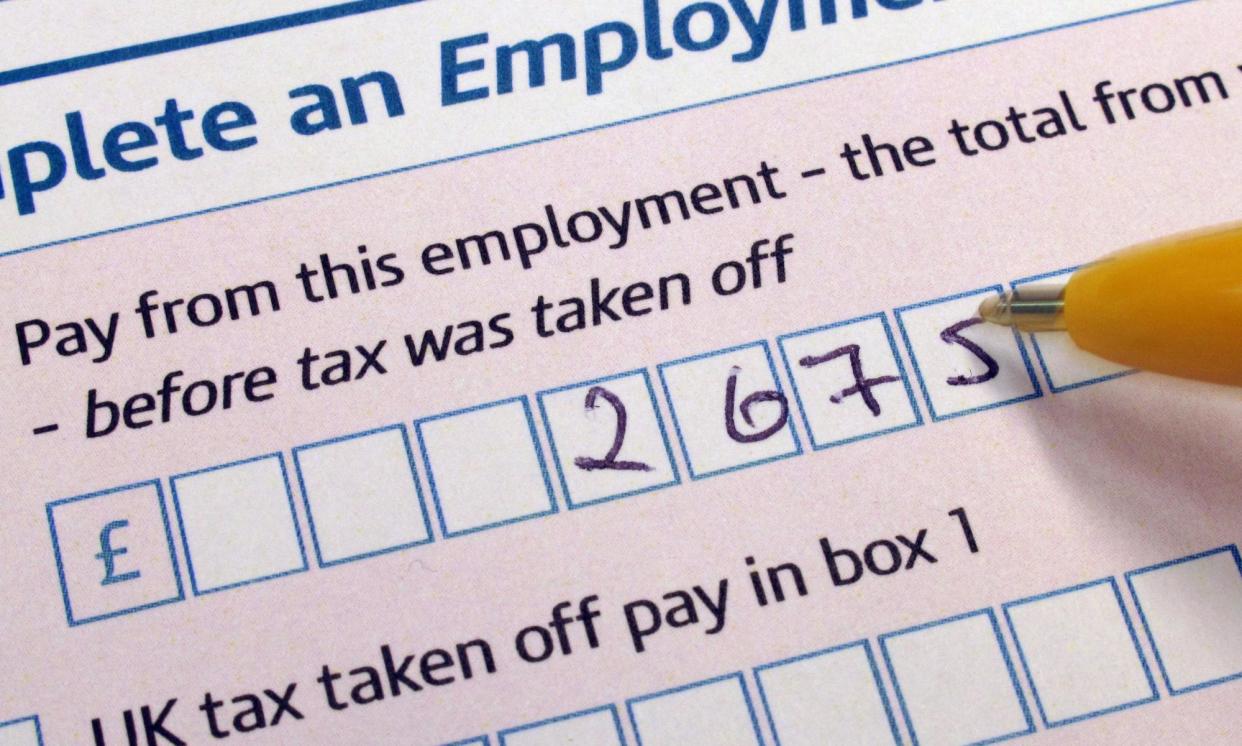Reality check: the truth behind the Tories’ £2,000 tax claim

Tax dominated the first head-to-head debate between Rishi Sunak and Keir Starmer with the prime minister making an eye-catching claim about what Labour’s plans would involve.
Sunak claimed “independent Treasury officials” had costed Labour’s policies “and they amount to a £2,000 tax rise for everyone”. Starmer dismissed the claim as “absolute garbage”. Today, Labour’s frontbench have gone further, accusing Sunak of telling a “big desperate lie”.
So who is telling the truth?
What is the claim?
Sunak said Labour has made spending pledges amounting to £38.5bn over a four-year parliament and has not said how it will pay for them. The Conservatives say that, to meet these pledges, Labour would need to borrow more or increase taxes. Borrowing more would mean Labour breaking its commitment to reduce debt, so Sunak’s claim in the TV debate was that Labour would raise taxes by £2,000 a household by the end of the next parliament.
The Tories are hoping for a repeat of their 1992 election success, when the campaign was dominated by Labour’s plans to use higher taxes to pay for more generous benefits.
How has the £2,000 figure been arrived at?
The Conservatives say Labour has made spending commitments totalling £58.9bn by 2028-29. Over the same period it says Labour’s announced tax increases – such as putting VAT on private school fees – would raise £20.4bn. That, Sunak says, leaves a “black hole” of £38.5bn. There are 18.4m households in the UK where at least one person is working and therefore eligible to pay tax. Divide £38.5bn by 18.4m and that amounts to an average of £2,094 for a working household.
What does Labour say?
The £2,000 claim is not new and Labour put out a detailed response when it first surfaced last month. Labour said the costings in the Conservative party’s document were riddled with 11 “glaring mistakes”. These included using assumptions made by special advisers – political appointees who work for ministers – rather than relying on costings made by independent Treasury civil servants.
Starmer’s problem in the TV debate was that he was slow to rebut Sunak’s claim, only doing so after the prime minister had repeated the claim 12 times.
What does the Treasury say?
Helpfully for Labour, the Treasury’s top mandarin – James Bowler – wrote to Darren Jones, the shadow chief secretary – making it clear the £2,000 figure “should not be presented as having been produced by the civil service”. The letter was sent on Monday, the day before the ITV debate, but Starmer did not mention it. Despite the rap on the knuckles from Bowler, Sunak has continued to use the £2,000 figure.
So is this simply a dodgy dossier?
Not entirely. The biggest Labour spending commitment identified by the Conservatives is the green prosperity plan (GPP). This has been watered down from an original pledge to spend £28bn on greening the economy, but Labour says it will still spend £23.7bn on the GPP in a five-year parliament. The Conservatives say this would be £19bn over four years, which is correct. Labour has not yet said how it will fund the extra spending but could probably do so by borrowing more while still sticking to its debt rule.
But are there more questionable assumptions?
Most certainly. One example is Labour’s aim of ending the contracting out of public services to private contractors. The Conservatives say insourcing would cost £6.5bn over four years, basing the claim on the alleged conclusions of a report by the Institute for Government (IfG) thinktank showing contracted-out services are 7.5% more efficient. The IfG report doesn’t actually say this, noting that the impact of outsourcing has been patchy. Indeed, the IfG report specifically warns against using the 7.5% figure, saying it has low confidence in it.
The Conservatives have also put a £4.5bn price tag on Labour’s pledge to offer free breakfast clubs at primary schools. This presumes that half of pupils take up the offer – a highly speculative assumption – and that a Labour government would foot the bill for both staffing and food.
Some of the policies costed by the Conservatives – such as provision of new mental health workers – are not actually Labour policy. Others – such as golden hellos for NHS dentistry – have already been adopted by the government.
What about Labour’s tax plans?
Labour has announced some limited – yet specific – tax increases to fund its spending commitments. Here, too, the assumptions made by the Conservatives are questionable. Some children currently privately educated are expected to move to the state sector when VAT is levied on school fees but the precise number is not yet known. The Conservatives are assuming 11% will move.
Will the Tory strategy work?
It will probably be an uphill struggle. In part that’s because taxes have gone up over the past four years and as a share of national income are on course to be the highest in more than 70 years. But the Conservatives have a shortfall problem of their own in the shape of their wish to abolish employee national insurance contributions, which Labour says would cost £46bn a year.
Thinktanks such as the Institute for Fiscal Studies and the Resolution Foundation question whether either the Conservatives or Labour will be able to meet their debt rules without borrowing more; increasing taxes; or imposing severe public spending cuts.

 Yahoo News
Yahoo News 
